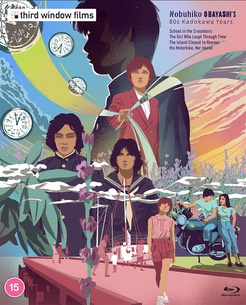News and Opinion
Obayashi in the Crosshairs

Ever since the director Obayashi Nobuhiko visited Yale in 2015, I’ve been significantly engaged with his cinema in one form or another, from curating a Japan Society retro to starting a book project (which occasioned an Obayashi workshop earlier this fall). This has recently extended to helping out with Blu-ray releases. Adam Torel of Third Window Films asked me last year to pen a piece for the booklet accompanying his release of Obayashi’s Anti-War Trilogy, and then this year asked for help with his release of four Obayashi films from the director's years working with Kadokawa Film. That has now come out in a box set titled Nobuhiko Obayashi’s 80s Kadokawa Years.
There is still relatively little written about Kadokawa in English (Alex Zahlten’s The End of Japanese Cinema is one significant exception), even though the films produced by Kadokawa Haruki—as well as his industrial strategy—helped define Japanese cinema in significant ways from the 1980s on. Given the image of Obayashi as an aesthetic rebel, established through the wild cinema evident in Hausu, it may seem peculiar that Obayashi not only made four films with Kadokawa, but got along with the eccentric producer quite well. Those films might challenge the Obayashi Hausu-image because most were idol movies and, like The Island Closest to Heaven, could have little of the "anything goes" film craft that supposedly defined Obayashi. As such, the Blu-ray releases might help take apart that image and spread understanding of Obayashi as a director of many faces and film styles.

